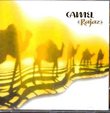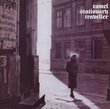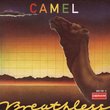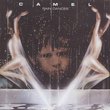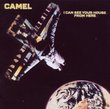| All Artists: Camel Title: Nude (Mlps) (Shm) Members Wishing: 4 Total Copies: 0 Label: Universal Japan Original Release Date: 1/1/2009 Re-Release Date: 6/2/2009 Album Type: Import Genres: Pop, Rock Styles: Progressive, Progressive Rock Number of Discs: 1 SwapaCD Credits: 1 |
Search - Camel :: Nude (Mlps) (Shm)
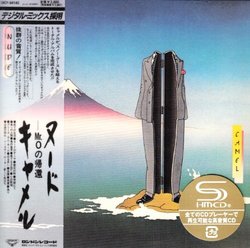 | Camel Nude (Mlps) (Shm) Genres: Pop, Rock
Japanese only SHM paper sleeve pressing. The SHM-CD [Super High Material CD] format features enhanced audio quality through the use of a special polycarbonate plastic. Using a process developed by JVC and Universal Music J... more » |
Larger Image |
CD DetailsSynopsis
Album Description Japanese only SHM paper sleeve pressing. The SHM-CD [Super High Material CD] format features enhanced audio quality through the use of a special polycarbonate plastic. Using a process developed by JVC and Universal Music Japan discovered through the joint companies' research into LCD display manufacturing* SHM-CDs feature improved transparency on the data side of the disc* allowing for more accurate reading of CD data by the CD player laser head. SHM-CD format CDs are fully compatible with standard CD players. Similar CDs
|
CD ReviewsWhy doesn't Amazon have this? S. C Sochet | syosset, NY United States | 04/11/2005 (5 out of 5 stars) "O The City Life. One of the coolest songs of the early 1980's. Nude is a very misleading title. It actually is a person's name! A concept album from an English band was fairly common back then. Even an historical one that takes place within the throes of World War II. Nicely produced, well connected songs. It's one of those CD's that makes you pay attention. Not many bands bother doing this type of music anymore, with the exception of Dream Theater and the most recent Green Day album. Hey Amazon, I had to search hard and finally ended up buying the CD from Ebay. Please get NUDE into your warehouse. It's from London Records, # 810 880-2. I recommend this, everyone." Excellent Album..can we find it??? Humberto Mejia | Perth, Australia | 06/25/2006 (5 out of 5 stars) "yes, there was a time in life back at the early 80s when I was young, free and had the time to hear this type of music because somebody in the world made it, and made a world of difference with it... then some years ago Camel passed through Caracas and I just had to see it, because deep in my heart I thought Latimer could not reproduce that magical guitar sound live..was I wrong!!! I must say I write this review to the younger souls who are exploring Camel.. this is an excellent record, back in those days we had the german vinyl edition... the battery work still is fresh on my memory.. this was the kind of holistic work that does not make much sense in fragmentating, as you would not do it with a simphony.. yes, the vocals are kind of weak, but that does not impede the unfolding of a marvelous story... I have been a Camel fan forever, yet some reviews make me think as to why this album is so unique.. it is unique, period, and its a collectors item.. somehow I feel envious of those who are about to listen to it.. enjoy " Surprisingly good album BENJAMIN MILER | Veneta, Oregon | 04/01/2006 (4 out of 5 stars) "I have not heard Breathless or I Can See Your House From Here, their previous two albums, but of course I'm very familiar with their first four albums with the original lineup and also Rain Dances. From my understanding both Breathless and I Can See Your House From Here demonstrated what went wrong with prog in the late '70s, the latter demonstrating that the band was no longer able to keep a steady lineup. One might expect Nude to follow in those footsteps, but actually it turned out to be their best since Rain Dances. Nude, in this case, was a name of a person, a Japanese WWII soldier stranded in the jungle of the South Pacific who returned home not realizing the war was over. The album pretty much paralleled the story of a real Japanese WWII solder (name escapes me) stranded in the jungle, returned home to Japan in the 1970s, only to be appalled by the grossly materialistic society the Japanese had adopted, so he moved to South America (Brazil to be exact).
Regardless, Nude might not be their best album, Camel newcomers are obviously advised to start with Mirage or Moonmadness, as those demonstrate Camel at their best. Here, it's only Andy Ward and Andy Latimar who were left from the original lineup (and Ward was to leave after this album, leaving Camel to be Latimer and whoever he could find at the time). Some of the musicians on this album included Duncan MacKay, who previously appeared on three Alan Parsons Project albums, I Robot, Pyramid and Eve, Mel Collins, who been with Camel since Rain Dances (and let's not forget his involvement with bands like King Crimson, the Alan Parsons Project, Clannad, and many others), Colin Bass, who first appeared on I Can See Your House From Here is still providing bass work (appears to be fretless), and even Jan Schelhaas (ex-Caravan) makes some appearances here. The first two cuts, "City Life" and "Nude" are more or less in the pop-oriented vein, much like what too many other prog band in the late '70s and early '80s that survived this long had done. But then the rest of the album has some great prog, but some rather New Age-y numbers I can live without, as it seems to clash with the prog. There's even a passage with a marching band that got me thinking of Mirage. It's obviously the band really shines when they stick to prog here, because it really showed a band can still make great prog in the early '80s if they actually tried, and they did. Yeah, I find the album a bit uneven in places, but it's still worth having, and definately a lot better than what too many other prog rock bands were doing at the time (certainly a lot less pop-oriented than the Genesis album at the time, Abacab)." |

 Track Listings (14) - Disc #1
Track Listings (14) - Disc #1